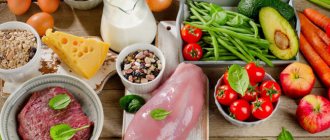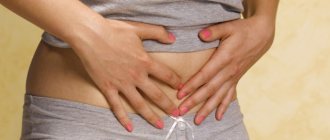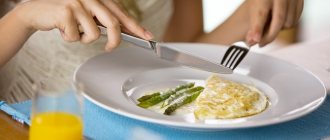The cause of food intoxication can be a poorly cooked steak, stale fish, ready-made food from a restaurant, an exotic dish, or poorly washed fruit. If food is prepared incorrectly or from expired products, it can cause poisoning. Along with bad food, pathogenic bacteria enter the body, which cause intestinal intoxication.
In case of poisoning, it is very important to take timely measures to remove toxins, as well as follow a diet. A proper diet will help the adult body get into shape faster.
What can you eat if you have diarrhea?
- Diet for diarrhea should include foods high in pectin: applesauce, bananas, yogurt. Pectin, a water-soluble fiber, helps relieve intestinal upset.
- Pay attention to foods rich in potassium - fruit juices, jacket potatoes, bananas. When there is an intestinal disorder, the body actively loses potassium and needs to be restored.
- Don't forget to add salt to your dishes. Meals should include salty soups, broths, crackers, etc., which will help retain water in the body and avoid dehydration.
- Get enough protein. If you have an intestinal upset, you can eat lightly fried beef, turkey, chicken or hard-boiled eggs to avoid fatigue and tiredness.
- Eat vegetables and fruits after hot processing. Some raw vegetables and fruits can make diarrhea worse. While on a diet, try a simple soup with asparagus, carrots, beets, zucchini, mushrooms or celery, cream soup or jacket potatoes.
Up to contents
Sample menu after poisoning
The first day after food poisoning is better not to eat anything. If you feel very hungry, you can drink a little rice water. It is better to use brown rice for cooking.
After the unpleasant symptoms disappear, you can eat little by little. To improve the functioning of the digestive system, adults follow a diet for 5-10 days after poisoning.
Let us give examples of therapeutic dietary nutrition used in the treatment of diseases of the digestive tract.
| Diet No. 1A Calorie content: 1900–2000 kcal | Diet No. 2 Calorie content: 2800–3000 kcal | |
| First breakfast | — steam omelet or soft-boiled eggs; - warm low-fat milk. | - oatmeal or semolina porridge; - low-fat cheese; - weak tea. |
| Lunch | - milk. | - rosehip decoction. |
| Dinner | — pureed oatmeal soup, steamed chicken fillet; - fruit jelly. | - vegetable or meat broth; — steamed cutlets from lean meat; - mashed potatoes; - dried fruits compote. |
| Afternoon snack | - milk cream; - rosehip decoction. | - rosehip decoction. |
| Dinner | - liquid rice porridge (crushed); - milk. | - Steamed fish; - rice pudding; - tea or cranberry juice. |
| Drink at night | - milk. | - kefir or yogurt. |
Recommended dishes also include vegetable soups, boiled porridges, except pearl barley and millet, baked meat puddings, and cottage cheese casseroles. It is advisable to grind porridges and soups with a blender. This way they will be better absorbed.
To prepare meat dishes, it is advisable to use veal, beef, turkey or chicken. Steamed meatballs, meat pate or casserole will be completely dietary dishes. You are allowed to eat fish balls and chicken breast. You can make puddings from berries and fruits; bananas and baked apples are also allowed.
As additional support for the body, you can use sorbents, for example, Fitomucil Sorbent Forte. Enterosorbent will remove harmful substances, cope with pathogenic microorganisms, and restore normal intestinal microflora. The drug contains five types of live probiotic bacteria, as well as psyllium and inulin.
What should you avoid if you have diarrhea?
- Avoid drinks and foods that contain caffeine or are very hot or cold. It will irritate the gastrointestinal tract.
- During the diet, avoid fatty, fried and heavy foods. Eating this way will only make your intestinal upset worse.
- Avoid foods that cause gas accumulation in the intestines - chewing gum, carbonated drinks. They irritate the digestive tract.
- Limit milk and dairy products. They may be hard to digest.
- Avoid nuts, raw fruits and vegetables, bran and whole grain bread in your diet. They irritate the digestive tract.
Try not to smoke or drink alcohol.
A complete list of what to eat for diarrhea is contained in the “Table No. 4” diet.
Up to contents
Basic principles of nutrition
Food must contain the required amount of proteins, fats and carbohydrates. To quickly normalize the functioning of the digestive organs, it is important to adhere to the basic rules:
- Eat small meals, at least 5–7 times a day. The intervals between meals should not exceed three hours. Let the portions be small for the first few days: no more than 200 g. This will reduce the load on the digestive tract, increase the digestibility of food, and activate the functioning of the stomach and intestines.
- Maintain drinking regime. Drink at least 2 liters per day. Drink 50-100 ml of water every half hour. It is recommended to drink mineral or filtered water without gas.
- Eat chopped foods. Puréed food is easier to digest. Food should be boiled or steamed. All food and liquids must be warm: between 15 and 50 °C.
- Avoid foods that increase secretion in the stomach and intestines. These include complex carbohydrates in raw form: sour berries, fruits, starchy vegetables, plant fiber.
- Avoid alcoholic drinks completely. Alcohol inhibits regeneration processes and strains the kidneys and liver. Reduce the amount of salt. You are allowed to consume no more than 6 g per day, that is, less than one teaspoon.
After food poisoning, the diet should be especially strict. Add new dishes to your diet gradually, carefully monitor your health.
Gentle mode
With diarrhea, it is necessary to provide the patient’s body with energy, but this must be done carefully. Preference should be given to easily digestible foods: boiled, steamed and then pureed. Steamed cutlets, quenelles, soufflés made from tender lean meat or fish are the best source of protein. Slimy cereal soups with low-fat light broth are recommended. Porridges made from rice, oatmeal, or buckwheat must be wiped before use.
Allowed are soft-boiled eggs or in the form of a steamed omelet, fresh unleavened cottage cheese, pureed baked apples, jelly made from fruits and berries that have a fixing effect (pear, blueberry, dogwood, quince). The only fat allowed is butter – it can be added little by little to prepared dishes.
For diarrhea, it is useful to eat yesterday's wheat bread and wheat crackers - they have adsorbent properties. Other baked goods are excluded.
What to eat?
During the acute period of the disease (1-2 days), some doctors advise fasting. This method is justified if diarrhea is caused by infection or poisoning. These conditions are usually accompanied by other symptoms and loss of appetite.
If the cause of the malaise is functional disorders of the intestines, and the appetite remains, then nutrition is not completely excluded.
During diarrhea, you need to eat light, high-calorie foods that are quickly digested. Portions should be small.
What you can eat: | |
| In the first days | Boiled rice, rice water; Baked apples and pears; White bread crackers; Liquid porridges (semolina, rice, oatmeal). |
| After stabilization | Boiled carrots; Vegetable soups; Steam omelette; Lean meat, fish Kissel; Green tea with honey. |
Fully or partially limited products
Products containing fiber are excluded: vegetables (you can add decoctions to soup), bran, rye and bran bread, whole grain bread, with the addition of seeds and cereals.
Fresh bread, pastries, and flour products cause fermentation and rotting in the intestines. For the same reason, jam, dried fruits, honey, and sweets are not allowed. Sugar in limited quantities (50 g per day is added to all dishes).
Porridges made from coarse cereals (millet, barley, pearl barley), legumes are poorly digestible foods and must be excluded. Rich fatty broths are prohibited, as they enhance peristalsis, fatty meats, fish, and canned food.
Whole milk, cream, sour cream and cheese can to some extent cause diarrhea. Milk in diluted form can only be used for making puddings.
Kvass, cocoa and coffee with milk, carbonated drinks increase peristalsis and bloating, and are therefore unacceptable. You cannot eat sauces, marinades, or smoked foods.
Table of prohibited products
| Proteins, g | Fats, g | Carbohydrates, g | Calories, kcal | |
Vegetables and greens | ||||
| vegetables | 2,5 | 0,3 | 7,0 | 35 |
| vegetables legumes | 9,1 | 1,6 | 27,0 | 168 |
| potato | 2,0 | 0,4 | 18,1 | 80 |
| horseradish | 3,2 | 0,4 | 10,5 | 56 |
Fruits | ||||
| bananas | 1,5 | 0,2 | 21,8 | 95 |
| melon | 0,6 | 0,3 | 7,4 | 33 |
Berries | ||||
| grape | 0,6 | 0,2 | 16,8 | 65 |
Mushrooms | ||||
| mushrooms | 3,5 | 2,0 | 2,5 | 30 |
Nuts and dried fruits | ||||
| dried fruits | 2,3 | 0,6 | 68,2 | 286 |
Cereals and porridges | ||||
| pearl barley | 9,3 | 1,1 | 73,7 | 320 |
| Wheat groats | 11,5 | 1,3 | 62,0 | 316 |
| millet cereal | 11,5 | 3,3 | 69,3 | 348 |
| barley grits | 10,4 | 1,3 | 66,3 | 324 |
Flour and pasta | ||||
| pasta | 10,4 | 1,1 | 69,7 | 337 |
Bakery products | ||||
| vysivkovy bread | 9,0 | 2,2 | 36,0 | 217 |
| Old Russian grain bread | 9,6 | 2,7 | 47,1 | 252 |
| Rye bread | 6,6 | 1,2 | 34,2 | 165 |
Confectionery | ||||
| jam | 0,3 | 0,2 | 63,0 | 263 |
| jam | 0,3 | 0,1 | 56,0 | 238 |
| candies | 4,3 | 19,8 | 67,5 | 453 |
| cookie | 7,5 | 11,8 | 74,9 | 417 |
Ice cream | ||||
| ice cream | 3,7 | 6,9 | 22,1 | 189 |
Cakes | ||||
| cake | 4,4 | 23,4 | 45,2 | 407 |
Raw materials and seasonings | ||||
| seasonings | 7,0 | 1,9 | 26,0 | 149 |
| mustard | 5,7 | 6,4 | 22,0 | 162 |
Dairy | ||||
| kefir | 3,4 | 2,0 | 4,7 | 51 |
| sour cream | 2,8 | 20,0 | 3,2 | 206 |
Cheeses and cottage cheese | ||||
| cheese | 24,1 | 29,5 | 0,3 | 363 |
Meat products | ||||
| pork | 16,0 | 21,6 | 0,0 | 259 |
| ham | 22,6 | 20,9 | 0,0 | 279 |
Sausages | ||||
| dry-cured sausage | 24,1 | 38,3 | 1,0 | 455 |
| sausages | 10,1 | 31,6 | 1,9 | 332 |
| sausages | 12,3 | 25,3 | 0,0 | 277 |
Bird | ||||
| duck | 16,5 | 61,2 | 0,0 | 346 |
| goose | 16,1 | 33,3 | 0,0 | 364 |
Fish and seafood | ||||
| dried fish | 17,5 | 4,6 | 0,0 | 139 |
| smoked fish | 26,8 | 9,9 | 0,0 | 196 |
| canned fish | 17,5 | 2,0 | 0,0 | 88 |
Oils and fats | ||||
| vegetable oil | 0,0 | 99,0 | 0,0 | 899 |
| animal fat | 0,0 | 99,7 | 0,0 | 897 |
| cooking fat | 0,0 | 99,7 | 0,0 | 897 |
Non-alcoholic drinks | ||||
| bread kvass | 0,2 | 0,0 | 5,2 | 27 |
Juices and compotes | ||||
| juice | 0,3 | 0,1 | 9,2 | 40 |
| * data is per 100 g of product | ||||
It happens inside of us
The body does not recover immediately after suffering intoxication, because toxic substances already had a detrimental effect on almost all organs. Often after poisoning, the stomach hurts - this is explained by the fact that the gastric mucosa becomes inflamed - acute gastritis develops. The stomach stops doing its usual job - digesting food. Nausea, belching and pain appear after poisoning. Poorly digested food enters the intestines. And he, of course, is “dissatisfied” with the poor functioning of the stomach, and his “indignation” is manifested by bloating, gurgling and diarrhea after poisoning.
First of all, the liver suffers from intoxication: it works around the clock, seven days a week, neutralizing toxic substances that enter the body. “Fatigue” of the liver may be indicated by heaviness in the right side, yellowness of the skin, bitterness in the mouth, and elevated temperature after poisoning. During the period while recovery from poisoning is underway, general weakness, pain in muscles and joints, poor appetite, insomnia and other symptoms may bother you.
During the recovery period, medications are prescribed that improve digestion processes (enzymes) and the intestinal sorbent Enterosgel, which neutralizes and removes toxic molecules.
To restore beneficial intestinal bacteria, doctors prescribe effective tablets after poisoning - probiotics.
What can you drink?
Adults need to drink plenty of mineral water and other drinks. These can be fruit juices, carrot juice, electrolyte solutions, or clear broth. During the period of diarrhea and for the next 3-5 days, when the condition begins to improve, you should not consume milk and dairy products, alcohol, apple juice, carbonated drinks, coffee and drinks containing caffeine. They can make dehydration worse. Infants and young children should be given frequent drinks using special rehydration solutions mixed with water. The amount of fluid consumed should exceed fluid loss in feces. If these losses are not replenished, you should consult your doctor.
References 1. Symptoms & Causes of Diarrhea, National Institute of Diabetes and Digestive and Kidney Diseases https://www.who.int/topics/diarrhoea/ru/ 2. A Diet Low in FODMAPs Reduces Symptoms of Irritable Bowel Syndrome. Emma P. Halmos, Victoria A. Power, Susan J. Shepherd, Peter R. Gibson, Jane G. Muir. ScienceDirect. https://www.sciencedirect.com/science/article/abs/pii/S0016508513014078 3. Fiber and Functional Gastrointestinal Disorders. William Chey et al. the American Journal of Gastroenterology. April 2013. https://www.researchgate.net/publication/236096907_Fiber_and_Functional_Gastrointestinal_Disorders 4. Les différents yaourts. Lanutrition.fr. 08/17/2010 https://www.lanutrition.fr/bien-dans-son-assiette/aliments/produits-laitiers/yaourt/les-differents-yaourts
Duration of diarrhea
In most cases, diarrhea does not last long. Diarrhea may continue for several hours after consuming the offending product. With allergies and food intolerances, diarrhea also does not torment the patient for too long.








